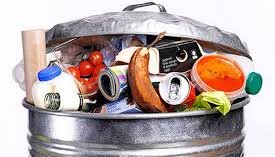Food waste is a topic that does not get nearly enough attention in the US. Food waste is defined as “food that is of good quality and fit for human consumption but that does not get consumed because it is discarded”. A 2009 study puts the estimated food waste across the globe at 32%. Based on what I see on a daily basis in the US, I would bet our number is much higher.
In the local sustainability marketplace this is topic is discussed more frequently. We have two issues: How do we prevent food waste? Once we have it, what do we do with it?
Preventing Food Waste
One prevention we must look more deeply to discover useful answers. We look at our own day to day environment. For example, a local industry event. Personally I attend somewhere between 3-6 per month – there are appetizers, drinks, finger foods. Most event organizers are loathe to run out, so we tend to over order a little. What happens to the leftover food? Does it get donated to a local shelter, get composted or just go in the trash? I often ask the caterers and mixed results that often include “I have no idea”. Many industries that deal with larger volumes of food service are changing their methods to help prevent food waste. For example, some local hospitals have changed their systems to allow inpatients to custom order their meals from a given selection – studies show that giving a choice results in about 30% less food waste. Some local schools are following suit and allowing the student body to order in advance customizable menus. Can you imagine the waste reduction just in the hospitals and schools in San Diego alone?
Diverting Food Waste
We have reduced food waste but we still have some. What do we do with it? The City of San Diego has a commercial food composting program at the Miramar Greenery. All that is required is separate containers to put the food waste in, some signage, and some additional training for your staff. See the City’s website for more information http://www.sandiego.gov/environmental-services/miramar/greenery/foodwaste/index.shtml
Some big names in San Diego are already participating – Sea World, Point Loma Nazarene University, MCRD, UCSD, SDG&E, Qualcomm, Sharp Hospital, and the Bayfront Hilton to name a few. See the listing herehttp://www.sandiego.gov/environmental-services/miramar/greenery/foodwaste/foodwasteparticipants.shtml
A big shout out to everyone participating! I am proud to report that some of the schools I have worked with recently have started on campus composting programs that are incorporated into the curriculum to teach and mold the next generation. Students not only learn to be stewards of their environment, but learn about nature, gain composting skills, and use the compost to maintain their school gardens.
What’s next in California?
In 2014, AB1826 was signed in California. This bill requires businesses to recycle their organic waste starting April 1, 2016. The goal of this bill to divert some of the 30 million tons of organic waste from the landfills – it is estimated that more than 30% of this waste is organic,and therefore could be composted or broken down through anaerobic digestion.
What can I do?
The websites above provide some information you can use to get your business on a food waste recycling program. You can also do your own at home using open or closed bin composting, or vermicomposting (composting with worms). Done properly (which is not difficult or time consuming) these methods are very effective and will reduce the trash and recycling needs substantially.
Here is a great article from Green Biz about food waste reduction across the globe, and what some big names are doing to help. What will you do?
http://www.greenbiz.com/article/400-consumer-goods-companies-commit-cut-food-waste-half

